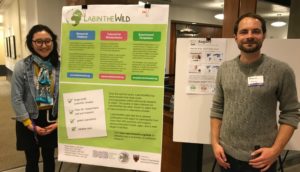Photo: CoAI team, Joseph Janizek and Gabriel Erion with Tim Porter at the Allen School
Madrona awarded the 14th Annual Madrona Prize to the CoAI team at the University of Washington’s Paul G. Allen School of Computer Science & Engineering. CoAI: Cost Aware Artificial Intelligence for Health Care applies ML to help healthcare professionals use accurate predictive models in time-sensitive and potentially life-threatening situations. The field of cost-sensitive ML builds algorithms that automate the feature selection step, automatically choosing the best subset of input variables to make a high-accuracy prediction. CoAI applies this field to the clinical setting — where “cost” is time — and enables, for instance, an EMT to run the appropriate predictive model while in the ambulance ride to the ER, rather than losing critical minutes after the patient arrives.
The team of consisted of PhD/MD graduate students Gabriel Erion and Joseph Janizek with MDs, Carley Hudelson and Nathan White and the head of UW’s Laboratory for Artificial Intelligence for Medicine and Science, Professor Su-In Lee.
The Madrona Prize is awarded at the end of the Allen School’s annual Industry Affiliates Research Day. The event includes technical talks throughout the day and culminates in an open house and poster session that showcases the latest research projects and papers being pursued by faculty and students at the school. The Madrona Prize has been awarded for 13 straight years and goes to the project that combines excellent research with what we feel is the greatest commercial potential. Since Madrona’s inception more than two decades ago, Madrona has funded 18 companies out of the Allen School. These companies include Impinj (NAS:PI), SkyTap and Turi (acquired by Apple), and most recently, OctoML, a company based on the TVM research project that won a Madrona Prize in 2017.
“The Allen School at the UW is an incredibly important resource for our region and as the school has grown and actively attracted researchers from many different areas, we have seen the breadth and depth of innovation grow,” said Tim Porter managing director, Madrona Venture Group. “Talking with the students during the research day is truly one of the highlights of our year, and we are both excited and inspired by all of the innovative projects we saw.”
Each year, the Madrona committee also awards runner-up prizes. This year the runners up were:
Runners Up
AuraRing: Precise Electromagnetic Finger Tracking via Smart Ring
Farshid Salemi Parizi, Eric Whitmire, Alvin Cao, Tianke Li, Ishan Chatterjee
Advisor: Shwetak Patel
HomeSound: Exploring Sound Awareness In The Home For People Who Are Deaf And Hard Of Hearing
Dhruv Jain, Kelly Mack, Steven Goodman
Advisors: Leah Findlater and Jon Froehlich
Molecular tagging with nanopore-orthogonal DNA strands
Katie Doroschak, Karen Zhang, Melissa Queen, Aishwarya Mandyam, Jeff Nivala
Advisors: Karin Strauss and Luis Ceze
For past winners visit click here.
